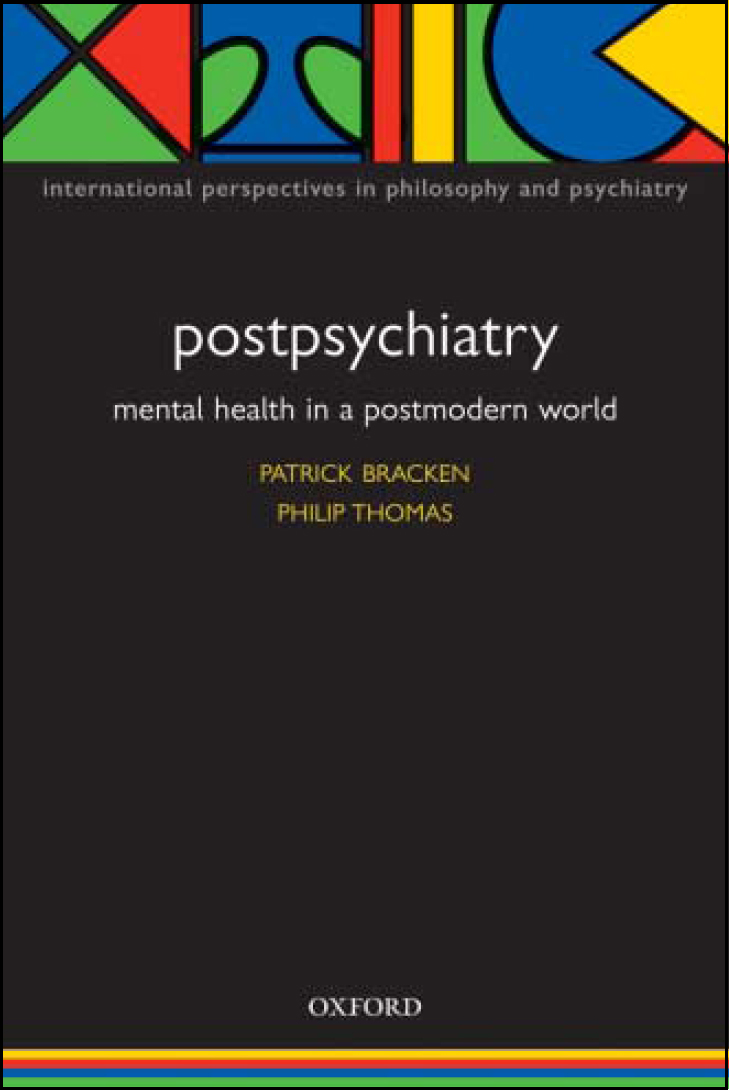
A welcome manifestation of the reawakening of interest in the philosophical basis of psychiatry has been the recent series of books on the subject, edited by Bill Fulford and colleagues. Now comes a new addition to the series by Pat Bracken and Phil Thomas, who, over the years, have published a wide range of articles and commentaries, which have been critical of psychiatric orthodoxy. Their BMJ paper on ‘postpsychiatry’ (Reference Bracken and ThomasBracken & Thomas, 2001) created much animated and, at times, acrimonious debate. This book represents a more extended account of their views, and encompasses such topics as phenomenology, linguistics, narrative-based medicine and representation in art. Their chosen guides to this cultural terrain are Foucault, Heidegger and Wittgenstein.
At the core of the authors’ thesis is a critique of what they see as the negative consequences of the European Enlightenment. While keen to acknowledge the successes of the legacy of the Age of Reason, they also wish to expose its limitations. Modern psychiatry has its origins in the Enlightenment, whose leading thinkers held that reason would solve the problems of humanity and unlock the mysteries of the mind. This, in the authors’ view, has led to the inappropriate application of ‘scientific’ technologies to the mad and distressed. This approach places little weight on such factors as meaning, value and social context. The authors wish to bring to the fore these factors, which they regard as vital to a proper understanding of human beings, and they propose that a hermeneutic rather than a biological ‘reductionist’ approach is the most apt. Michel Foucault had famously stated that the language of psychiatry is a monologue of reason about madness. Postpsychiatry, the authors declare, aims to put an end to this monologue and allow other voices to be heard.
At one time Bracken and Thomas might have been perceived as operating on the fringes of the discipline. However, a meeting on critical approaches to psychiatry at the annual meeting of the Royal College of Psychiatrists in Edinburgh in 2005 attracted a large audience and demonstrated that their concerns have a wide constituency, although apparently not in academic psychiatry. The growing division between clinical and university psychiatrists is noted by the authors, who attribute it to the impact on academia of the pharmaceutical industry, which is driving a narrowly neurobiological agenda to the exclusion of social and psychological factors.
A key chapter in the book is the fourth one, which examines the philosophical assumptions underlying models of psychopathology. Those who have looked into the subject will be aware that there has been a scholarly and often recondite debate concerning the origins of Jaspers’ thought. The authors not only give a very lucid and balanced account of the debate, but they demonstrate why such matters have major implications for the way we interact with patients. Do we adopt a supposedly ‘rigorous’ and ‘scientific’ medical gaze which attempts to separate a person's experience from their social and bodily context? This, according to the authors, is the Jasperian position. Or do we adopt a non-Cartesian approach, which emphasises cultural factors and the search for meaning, and which the authors themselves favour?
Bracken and Thomas also bring a critical eye to such subjects as evidence-based medicine, cognitive theories of mind and the role of the humanities: underlying intellectual assumptions are dissected and laid bare. The entire book seeks to stimulate debate, and one gains the impression that the authors would be disappointed if they did not provoke some discord. And, of course, they do provide much material for argument. Space does not permit the lengthy discussion which the book deserves, but we can consider one point. In their desire to pay heed to the voices of those who are mentally ill and to undermine those who would see psychiatry as a benign and essentially humane enterprise, the authors sometimes uncritically privilege the perspective of the sufferer or the critics of psychiatry. For instance, Andrew Scull's view that the Victorian asylum was a place for society to dump its ‘inconvenient’ people is presented without reference to studies, for example, of the Royal Edinburgh, Lancaster and Ticehurst Asylums, which demonstrate that patients were drawn from a wide range of society and were suffering from severe types of mental disturbance. However, enough has probably been said to indicate that this book provides an engaged and, at times, provocative critique of the current state of psychiatry. As such, it deserves a wide readership.



eLetters
No eLetters have been published for this article.